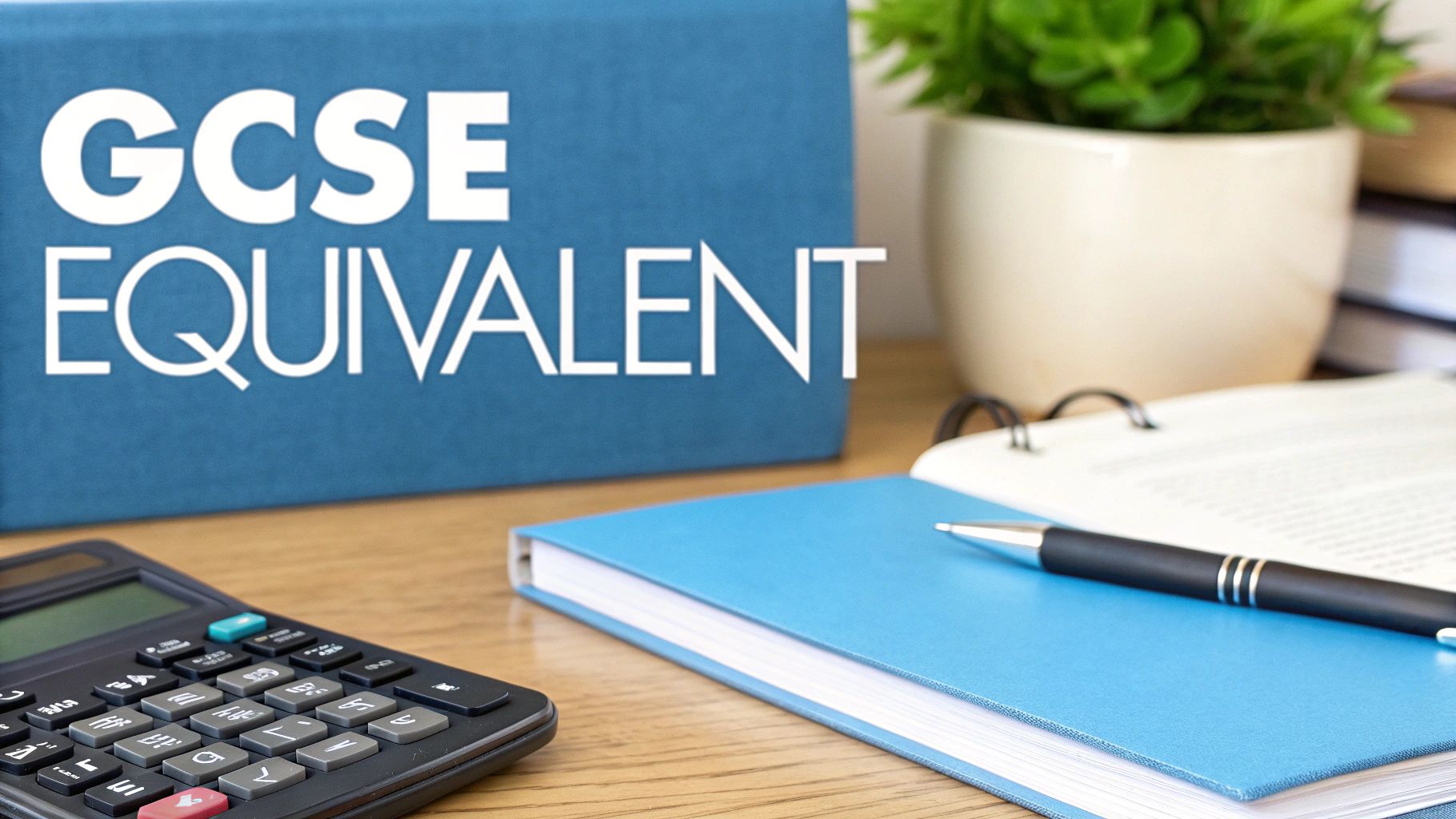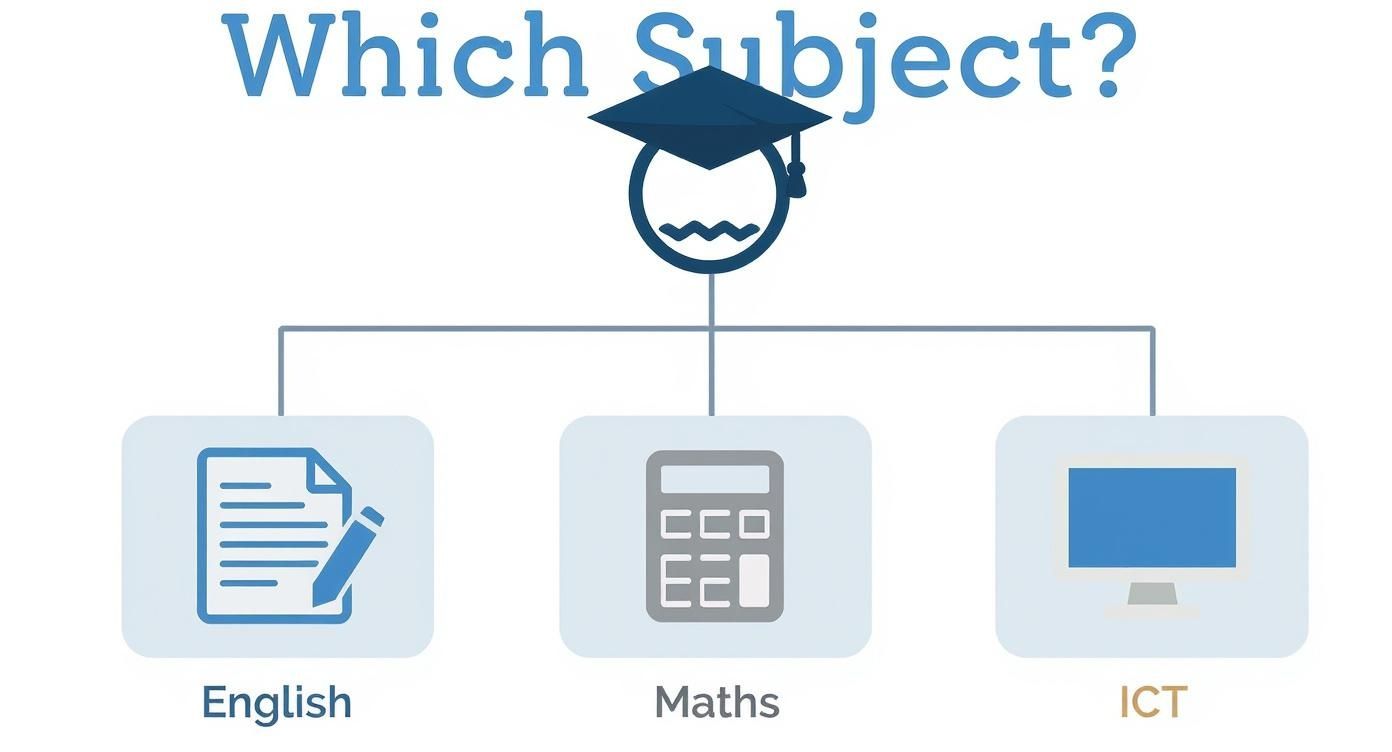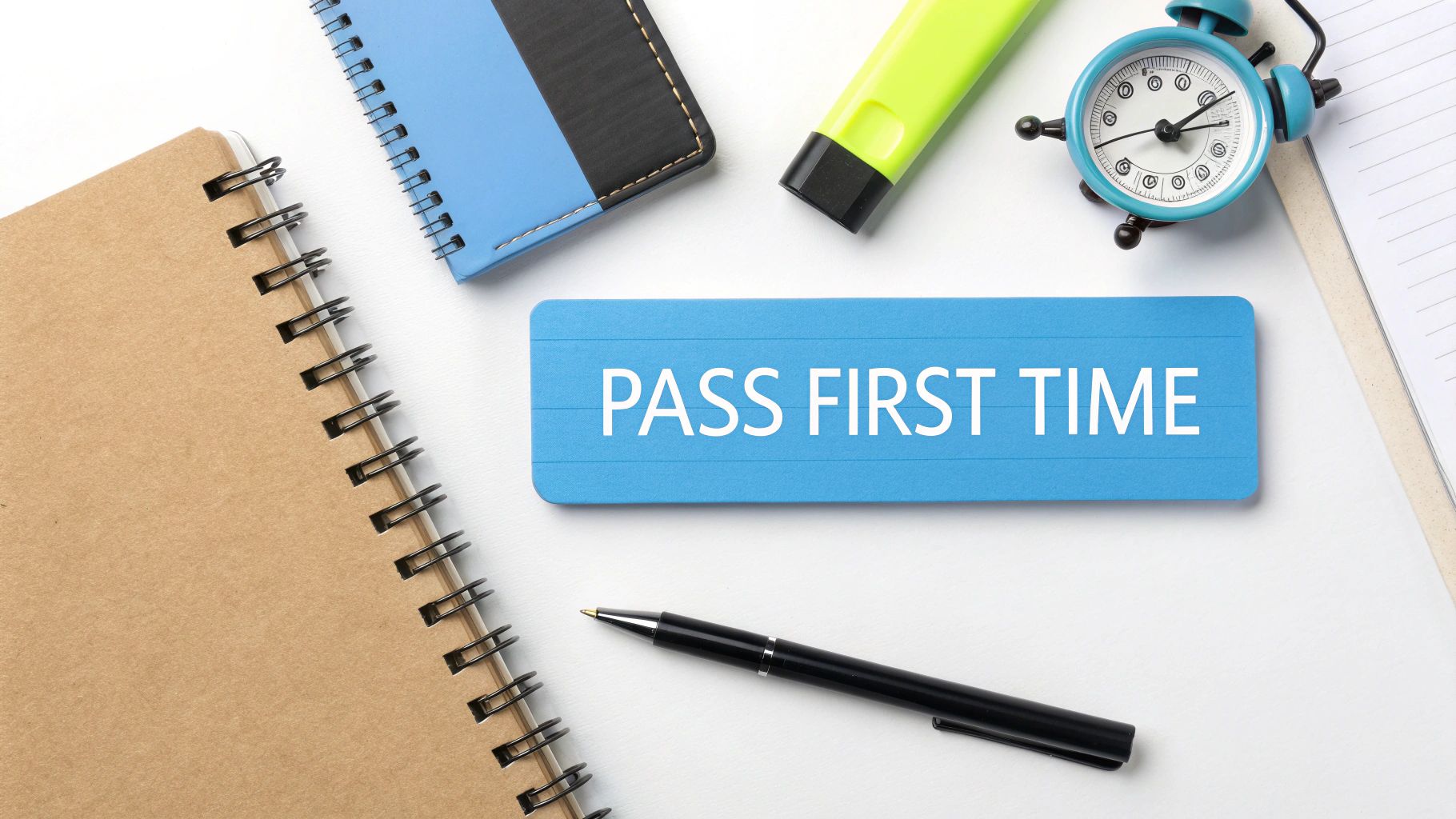If you’ve ever heard of Functional Skills Level 2, you might be wondering what they are and how they stack up against the more familiar GCSEs. Think of them less like a traditional academic exam and more like a driving test for essential life skills. They’re designed to prove you can handle the practical, real-world English, Maths, and ICT challenges you’ll face at work or in further education.
The goal isn't just to memorise information, but to show you can actually apply that knowledge in a practical way.
What Functional Skills Level 2 Really Means

Imagine trying to assemble flat-pack furniture. A traditional academic approach might ask you to write an essay on the history of Swedish design. Functional Skills, on the other hand, gives you the tools to actually get the job done: reading the instructions, measuring the components, and putting the wardrobe together correctly.
That’s the core mission of Functional Skills Level 2: to build your competence for real-life situations. Instead of analysing classic literature, you’ll learn how to write a clear, professional email. Instead of getting bogged down in abstract equations, you’ll figure out how to calculate a household budget.
Who Are These Qualifications For?
Functional Skills Level 2 courses are a perfect fit for a whole range of people, each with their own unique goals. They are an ideal solution if you are:
- An adult returning to education who needs a GCSE-equivalent qualification to get into university.
- A young person who needs Level 2 English and Maths to start an apprenticeship.
- A professional looking to upskill or meet the requirements for a promotion.
- Anyone who left school without a passing GCSE grade and wants a fresh, more practical route to success.
And they are incredibly popular. In the 2024/25 academic year, Level 2 courses, including Functional Skills, saw 368,400 participations in just the first three quarters among adult learners. This just goes to show how vital they are in helping people across the UK build their skills. You can explore more data on the importance of Level 2 qualifications in further education on GOV.UK.
Functional Skills aren't about proving you’re an academic; they’re about proving you are capable. They measure your ability to function effectively in a modern, skills-based world.
Ultimately, this qualification shows that you have the essential toolkit needed to solve problems, communicate clearly, and manage information. For a deeper dive, check out our complete guide on what Functional Skills qualifications are and how they can benefit you.
Next, we’ll look at how this powerful credential compares to a GCSE and what you can expect from the exams.
Understanding the GCSE Equivalence

It’s the question on almost everyone’s mind: “Is a Functional Skills Level 2 qualification really the same as a GCSE?” The simple answer is a resounding yes. Across the UK, universities, colleges, and employers officially recognise a Level 2 pass as equivalent to a GCSE at grade 4—what many of us still remember as a grade C.
Think of it like two different paths leading to the same destination. One route is the scenic country road (the GCSE), covering a broad landscape of academic theory. The other is a direct motorway (Functional Skills), built to get you where you need to go efficiently by focusing on essential, real-world skills.
Both routes are valid, and both are highly respected. The destination is a recognised Level 2 qualification, and official bodies hold both paths in the same high regard.
How the Qualifications Compare
While their value is the same, the journey and focus are quite different. GCSEs often test a wide academic curriculum, sometimes including theoretical concepts that don’t always pop up in daily life. A GCSE English exam, for instance, might ask you to analyse Shakespearean literature.
Functional Skills, on the other hand, zeroes in on practical ability. The English exam will ask you to draft a professional email or make sense of a workplace report. It’s all about proving you can apply your knowledge in realistic situations—which is exactly what employers and universities are looking for.
This practical focus makes Functional Skills Level 2 an excellent benchmark for readiness. In fact, achieving these qualifications is a key marker for educational progress in England, reflecting a standard comparable to securing five GCSEs at grades 9-4. Government data even shows that most young people hit this milestone by age 19, cementing its importance in post-16 education. If you're interested in the details, you can read the full Department for Education report on Level 2 attainment to see how it shapes national policy.
The key takeaway is this: while the assessment methods differ, the level of competence demonstrated is considered equal. Your Functional Skills certificate carries the same weight as a GCSE grade 4 certificate when you apply for jobs or further education.
Functional Skills Level 2 vs GCSE: A Quick Comparison
To help you decide which path is right for you, this table breaks down the key differences and similarities between these two important qualifications.
| Feature | Functional Skills Level 2 | GCSE |
|---|---|---|
| Primary Focus | Practical, real-world application of skills for work and life. | Broad academic knowledge and theoretical understanding. |
| Assessment Style | Scenario-based tasks that mimic everyday situations. | Formal examinations, essays, and sometimes coursework. |
| Grading System | Pass or Fail. A clear result showing competence. | Graded on a scale of 9 (high) to 1 (low). |
| Typical Use Case | Entry to apprenticeships, university (via Access courses), and jobs. | Direct entry to A-Levels and many university courses. |
Ultimately, choosing between them comes down to your personal learning style and goals. If you learn best by doing and want to prove your practical capabilities for a specific career or educational path, a Functional Skills Level 2 qualification is an excellent and highly respected choice.
Getting to Grips with Subjects and Exam Formats
A Functional Skills Level 2 qualification is built on three core pillars: English, Maths, and ICT. But these aren't your typical school subjects. They’re designed to test what you can do, not just what you know. Think of the exams as practical, real-world challenges you’d face in a job or in everyday life.
Understanding how these exams are put together is your first step towards smashing them. Let's break down exactly what each subject involves and what to expect on the big day.
Functional Skills English Level 2
Forget about dissecting Shakespeare or analysing old poems. Functional Skills English is all about clear, effective, and practical communication for the modern world. It’s a toolkit designed to prove you can read, write, and speak confidently in any professional or personal setting.
The assessment is split into three parts, and you need to pass all of them to get the qualification.
- Reading: This paper tests how well you understand and interpret different types of writing. You might be given an article, a set of instructions, or a workplace email and then asked questions to show you’ve understood the main points, spotted key details, and picked up on the writer's tone.
- Writing: Here's your chance to show you can produce clear and professional documents. You’ll typically be asked to write two or three different pieces, like a formal letter of complaint, an email to your manager, or maybe even a blog post. The focus is on clarity, correct grammar, using the right tone, and structuring your points logically.
- Speaking, Listening, and Communicating (SLC): This is the interactive bit. You'll usually take part in a group discussion and give a short presentation on a topic you're comfortable with. Assessors are simply looking to see if you can contribute to a conversation, listen to what others are saying, and get your own ideas across clearly.
The English component isn’t about becoming a literary critic; it’s about proving you're a competent communicator who can handle the everyday reading and writing tasks essential for any job.
Functional Skills Maths Level 2
For many people, the very idea of a maths exam brings them out in a cold sweat. But Functional Skills Maths is different. It’s designed to be directly useful in your day-to-day life, focusing on solving problems you’ll actually encounter, from managing your money to making sense of data at work. You can explore a range of flexible Functional Skills courses online that are designed to build your confidence in these exact areas.
The exam structure is straightforward and is all about testing your numeracy skills in a practical context.
It's usually split into two sections:
- Non-Calculator Section: This is the shorter part of the exam. It checks your core maths skills—things like working with fractions, decimals, and percentages—without any help from a calculator.
- Calculator Section: This is the longer section, and it throws more complex, multi-step problems at you based on realistic situations. You might need to figure out the best-value mobile phone contract, calculate the area of a room to buy new flooring, or interpret graphs from a business report.
The emphasis is always on the application of maths. It’s less about memorising formulas you’ll never use and more about knowing which tool to pull out of your toolbox to solve a real, practical problem. This approach makes the skills you learn useful from day one.
Awarding Bodies and Exam Variations
While the government sets the core curriculum for Functional Skills Level 2, several different awarding bodies are approved to offer the qualification. The big names you’ll likely come across are Pearson Edexcel, City & Guilds, and NCFE.
So, what does this mean for you? Well, the stuff you need to learn is exactly the same no matter which awarding body you go with. The principles of practical English and problem-solving Maths don’t change.
However, the look and feel of the exam papers can be slightly different. For example, one body’s paper might have a different layout or word its questions in a slightly different way. That’s why it’s crucial to check with your chosen exam centre which awarding body they use. This allows you to focus your revision on the right past papers, so you’re completely familiar with the format and there are no surprises on exam day.
Finding Your Path to Enrollment and Study
So, you’ve decided that a Functional Skills Level 2 qualification is the right move for you. Fantastic! The next step is figuring out how to get started. The good news is there isn't one single "correct" way to learn; the best path is always the one that fits your life, your budget, and how you like to study.
Think of it like planning a trip. Some people love an all-inclusive holiday where every detail is sorted for them, while others prefer the freedom of backpacking with just a map and a rough idea of where they're heading. Your approach to studying is much the same—you can pick a structured, supported route or a more independent one.
Choosing Your Study Method
Deciding how you'll prepare for your exams is a massive first step. Each approach offers a different mix of flexibility, support, and cost, so it’s worth thinking about what genuinely works for your personal situation.
- Online Courses: These are a brilliant blend of structure and freedom. You get well-designed course materials, access to tutor support, and often a community of other learners, but you can study from anywhere, anytime. It's an incredibly popular choice for adults juggling work, family, and other commitments.
- In-Person College Classes: If you learn best in a traditional classroom, local further education colleges often run Functional Skills courses. This route gives you face-to-face teaching, direct interaction with tutors, and a fixed timetable, which can be a great motivator for some.
- Self-Study with Textbooks: Are you highly disciplined and working to a tight budget? Self-study is a perfectly good option. You can buy revision guides and workbooks and set your own pace entirely. The biggest challenge here is keeping yourself motivated and not having a tutor to turn to when you hit a tricky spot.
This decision tree can help you visualise which subject might be the best starting point based on what you want to achieve.

As the infographic shows, English, Maths, and ICT open up different doors. It's all about picking the qualification that aligns with your immediate career or education goals.
Finding an Exam Centre and Booking Your Test
This is one of the most important—and often most confusing—parts of the journey, especially if you’re studying on your own. You can't just sit the exam anywhere; it has to be booked through an approved exam centre.
Here’s a critical piece of advice for everyone, particularly self-studiers: find and contact an exam centre before you get too deep into your revision. This way, you’ll know the process, costs, and availability well ahead of time. No last-minute panics!
Here’s a simple process you can follow:
- Search for Approved Centres: Use a search engine to look for "Functional Skills exam centres near me." Awarding body websites like Pearson or City & Guilds usually have handy centre locators.
- Contact the Centre: Get in touch and ask about their exam dates, fees, and—crucially—which awarding body they use. This is vital, as you'll want your practice papers to match the format of the real exam.
- Register as a Private Candidate: If you aren't enrolled on a course with that centre, you'll need to register as a "private candidate." They will walk you through the paperwork and payment process.
Exploring Funding and Costs
The cost of getting your Functional Skills Level 2 qualification can vary quite a bit. An online course, for instance, might bundle your tuition, materials, and even the exam fee into one package. For anyone looking for an affordable and comprehensive option, you can learn more about the NCFE Level 2 Functional Skills Mathematics course offered by Access Courses Online and how it can support your journey.
In some cases, you might be eligible for funding. For example, the government's "condition of funding" rules mean that 16 to 19-year-olds who don't have a Level 2 pass in English and Maths have to continue studying them. For adult learners, funding often depends on your age, employment status, and what qualifications you already have. It’s always worth checking with local colleges or providers to see if any financial support is available.
Proven Strategies for Passing Your Exams

Passing your Functional Skills Level 2 exams comes down to smart preparation, not just cramming information. If you can get inside the head of an examiner and understand what they're looking for, you'll have a massive advantage. This is your game plan for walking into that exam room feeling confident and ready to pass.
Think of your revision time like building a toolkit. It’s not enough to just have the tools; you need to know exactly how and when to use each one. For instance, just churning through past papers isn't the magic bullet. The real progress happens when you actively mark your own work, pinpoint where you dropped marks, and figure out the logic behind the correct answers. That’s how practice turns into real, measurable improvement.
Master the Maths Component
For many learners, the maths exam is the biggest hurdle. The statistics back this up. While pass rates for Level 2 English are usually pretty high (often over 80%), the pass rate for maths tends to hover around a much lower 61.3%. This tells us one thing loud and clear: you need a solid, targeted strategy for the numbers part.
One of the most common tripwires is the multi-step problem. These are the questions that ask you to do several calculations in a specific sequence to get to the final answer. The trick is to break them down into bite-sized chunks:
- Read the question slowly and carefully. What is it really asking you to do?
- Get your highlighter or pen out and underline the key numbers and instructions. This keeps you focused on what matters.
- Show your working. Write down every single step, even if you’re using a calculator. It helps you track your logic and can even bag you partial marks if you make a small mistake at the end.
To really get ahead, it's worth exploring how to study math effectively because it’s not about memorising formulas. It's about understanding the 'why' behind them. When you know why a certain formula works for calculating an area or a percentage, that knowledge sticks, and you can apply it to all sorts of different problems.
Sharpen Your English Skills
The English exam is all about practical, real-world communication. Forget analysing Shakespeare; this is about being clear and getting your point across, whether you’re reading or writing.
Success in the English exam is about efficiency and precision. Can you quickly grasp the main idea of a text? Can you write a clear email that gets your point across without waffle? These are the skills that matter.
For the reading paper, your biggest challenge is the clock. Get into the habit of skimming texts first to get a feel for the topic before you even look at the questions. Once you have the questions, you can scan the text for specific keywords to hunt down the answers quickly. It’s a simple trick that can save you precious minutes.
When it comes to the writing paper, it's all about structure and tone. Before your pen hits the paper, scribble down a quick plan—just a few bullet points for what you’ll cover in each paragraph. This simple step ensures your writing flows logically and doesn’t wander off-topic. And always, always leave a few minutes at the end to proofread. Catching those silly spelling or grammar mistakes is one of the easiest ways to pick up extra marks.
Unlocking Your Career and Education Opportunities
Getting your Functional Skills Level 2 qualification is a huge achievement, but it's not the end of the road. Think of it as the key that unlocks a whole new set of doors, leading to exciting opportunities in both your professional and academic life. This qualification is your proof that you’ve got the essential, real-world skills needed to succeed.
With this certificate in hand, you've ticked a major box for countless career paths and further education courses. It’s the foundational step that bridges the gap between where you are now and where you want to be, showing employers and universities that you're ready for the next challenge.
Your Gateway to Higher Education
If you thought university was out of reach without traditional GCSEs, think again. Your Functional Skills Level 2 qualification is a widely accepted equivalent, opening up several pathways to higher education. It’s the vital ingredient you need to get things moving.
Many learners use their new qualification to enrol on an Access to Higher Education (HE) Diploma. These diplomas are specifically designed for adults returning to education and are a direct route to a university degree.
Your Level 2 pass is the first domino to fall in a chain reaction of educational progress. It directly enables you to pursue Access to HE courses, which in turn lead straight to your chosen degree programme.
Universities all over the UK recognise Functional Skills as meeting their entry requirements for a huge range of courses, from nursing and social work to business and computing. It proves you have the literacy and numeracy skills you need to do well at an undergraduate level.
Boosting Your Career and Apprenticeship Prospects
In the job market, a Level 2 qualification in English and Maths is non-negotiable for a massive number of roles. It’s often one of the first things an employer looks for on a CV. From healthcare support worker roles in the NHS to skilled trades like plumbing and electrical engineering, this qualification is a must-have.
Here are just a few examples of where your skills are essential:
- Apprenticeships: Nearly all apprenticeships, from digital marketing to construction, require applicants to hold or be working towards Level 2 in English and Maths.
- Healthcare: Roles like healthcare assistant or support worker often list these qualifications as a mandatory entry requirement.
- Administration and Business: A solid grasp of professional communication and practical maths is crucial for any office-based role.
The skills you gain are also fantastic examples of transferable skills. You can learn more about what transferable skills are and see how they directly boost your employability. Ultimately, your Functional Skills Level 2 qualification is more than just a certificate—it's your passport to personal and professional growth, giving you the power to take the next confident step in your journey.
Got Questions? We’ve Got Answers
Stepping back into education can feel like navigating a maze. There are so many paths and qualifications, it’s easy to feel a bit lost. To help you get your bearings, we’ve put together some clear, no-nonsense answers to the questions we hear most often about Functional Skills Level 2.
How Long Will It Take Me to Get Qualified?
This is one of those "how long is a piece of string?" questions because it really comes down to you. There's no fixed timeline.
If you’re diving in headfirst with a dedicated online course, you could be exam-ready in as little as 8-12 weeks. But maybe you’re juggling a full-time job, a busy family life, or other commitments. If you need to take it slow, you might spread your studies over a few months. The most important thing is finding a rhythm that works for your life, not the other way around.
Can I Really Do My Exams from Home?
Yes, you absolutely can! Most providers now let you take your exams online from the comfort of your own home, which is a game-changer for so many people. It’s all done through a system called online invigilation.
All you really need is the basics:
- A quiet room where you can focus without any interruptions.
- A steady internet connection.
- A computer that has a working webcam and microphone.
A remote invigilator will watch over your exam via your webcam, just to make sure everything is above board and meets the official rules. It’s a super convenient and secure way to get your qualification without the hassle of travelling to an exam centre.
Taking your exam at home is brilliant for flexibility, but a little bit of prep goes a long way. Always run a quick tech check before the big day to make sure your computer and internet are playing ball. It’ll save you a world of stress!
What If I Don't Pass the First Time?
First off, don't panic. Hitting a stumbling block is disappointing, but it is definitely not the end of the road. One of the best things about Functional Skills is that you can simply resit the exam—you don’t have to go back and do the whole course again.
Most places will give you really helpful feedback showing exactly where you went wrong. This means you can laser-focus your revision on those weaker areas before you book another attempt. The whole process is designed to help you get there in the end, not to penalise you for a tough first try.
Ready to open the door to university and your dream career? Access Courses Online provides accredited, flexible online courses built for your success. Check out our Functional Skills and Access to HE Diplomas and take the first step on your journey today.

